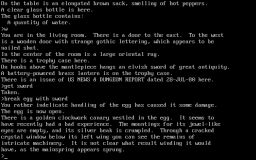Difference between revisions of "Zork"
(adjust year) |
(slight change in wording) |
||
| (One intermediate revision by the same user not shown) | |||
| Line 4: | Line 4: | ||
release=1977| | release=1977| | ||
alternateNames=Dungeon| | alternateNames=Dungeon| | ||
developer=[[ | developer=[[Dave Lebling]], [[Bruce Daniels]],<br />[[Marc Blank]], [[Tim Anderson]]| | ||
publisher=[[Massachusetts Institute of Technology|MIT]]| | publisher=[[Massachusetts Institute of Technology|MIT]]| | ||
distributor=[[Massachusetts Institute of Technology|MIT]]| | distributor=[[Massachusetts Institute of Technology|MIT]]| | ||
platforms=PDP-6, PDP-10| | platforms=DOS, PDP-6, PDP-10| | ||
engine=[[Glk/Frotz|Frotz]], [[Glk/Glulxe|Glulxe]], [[Glk/TADS|TADS]]| | engine=[[Glk/Frotz|Frotz]], [[Glk/Glulxe|Glulxe]], [[Glk/TADS|TADS]]| | ||
support=Not yet.| | support=Not yet.| | ||
purchase=[[Where to get the games#Other Games|Yes]]| | purchase=[[Where to get the games#Other Games|Yes]]| | ||
}} | }} | ||
'''Zork''' is a text adventure that is the first game in the [[Zork series | '''''Zork''''' is a text adventure that is the first game in the [[Zork series|''Zork'' series]]. | ||
Zork was developed on MIT's ITS operating system for the PDP-6 and PDP-10 mainframe computers, between 1977 and 1978 by MIT university students Dave Lebling, Bruce Daniels, Marc Blank, and Tim Anderson. | ''Zork'' was developed on MIT's ITS operating system for the PDP-6 and PDP-10 mainframe computers, between 1977 and 1978 by MIT university students [[Dave Lebling]], [[Bruce Daniels]], [[Marc Blank]], and [[Tim Anderson]]. | ||
==Versions== | |||
''Zork'' was freely released on the ARPANET, the precursor of the internet. However, when three of the four designers of ''Zork'' formed [[Infocom]], it was split into three text adventure games (''[[Zork I: The Great Underground Empire|Zork I]]'', ''[[Zork II: The Wizard of Frobozz|II]]'', and ''[[Zork III: The Dungeon Master|III]]'') so that it could be released commercially on the personal computer hardware of the time. | |||
[[Volker Blasius]] ported ''Zork'' to DOS in 1987. | |||
The original version of ''Zork'' has also been converted to several scripting languages: | |||
*A [[Glk/TADS|TADS]] version was developed by [[Darin Johnson]] in 1996. | |||
*A [[Glk/Glulxe|Glulx]] version was developed by [[Ethan Dicks]] in Inform 6 in 2004. | |||
*A [[Glk/Frotz|Z-code]] version was developed by [[Dean Menezes]] in Inform 7 in 2008. | |||
It has been ported to other scripting languages such as [[Glk/Glulxe|Glulx]], [[Glk/TADS|TADS]], and [[Glk/Frotz|Z-code]]. | It has been ported to other scripting languages such as [[Glk/Glulxe|Glulx]], [[Glk/TADS|TADS]], and [[Glk/Frotz|Z-code]]. | ||
Revision as of 11:16, 18 March 2020
| Zork | ||
|---|---|---|

| ||
| First release | 1977 | |
| Also known as | Dungeon | |
| Developed by | Dave Lebling, Bruce Daniels, Marc Blank, Tim Anderson | |
| Published by | MIT | |
| Distributed by | MIT | |
| Platforms | DOS, PDP-6, PDP-10 | |
| Resolution | (unknown) | |
| Engine | Frotz, Glulxe, TADS | |
| Support | Not yet. | |
| Available for Purchase |
Yes | |
Zork is a text adventure that is the first game in the Zork series.
Zork was developed on MIT's ITS operating system for the PDP-6 and PDP-10 mainframe computers, between 1977 and 1978 by MIT university students Dave Lebling, Bruce Daniels, Marc Blank, and Tim Anderson.
Versions
Zork was freely released on the ARPANET, the precursor of the internet. However, when three of the four designers of Zork formed Infocom, it was split into three text adventure games (Zork I, II, and III) so that it could be released commercially on the personal computer hardware of the time.
Volker Blasius ported Zork to DOS in 1987.
The original version of Zork has also been converted to several scripting languages:
- A TADS version was developed by Darin Johnson in 1996.
- A Glulx version was developed by Ethan Dicks in Inform 6 in 2004.
- A Z-code version was developed by Dean Menezes in Inform 7 in 2008.
It has been ported to other scripting languages such as Glulx, TADS, and Z-code.